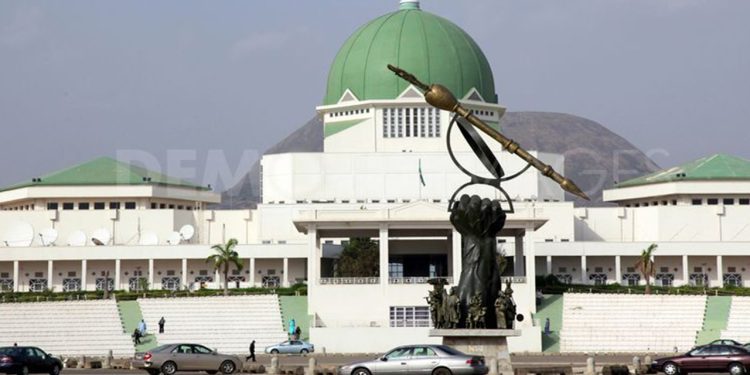In a democratic system, the legislature plays a crucial role in ensuring the sustainability and functioning of the democratic process. In Nigeria, the National Assembly, composed of the Senate and the House of Representatives, holds paramount importance in upholding democratic values and promoting good governance. The significance of the National Assembly to democratic sustainability in Nigeria cannot be overstated, as it serves as a vital check on executive power, fosters transparency and accountability, and provides a platform for public representation and policymaking.
TVC News Senior Executive, Digital and Social Media, Wasiu Salami writes on the significance of National Assembly to Democratic Sustainability in Nigeria.
One of the primary functions of the National Assembly is to act as a check on the executive branch. Through the enactment of laws, the legislature ensures that the actions of the government are in line with democratic principles and the rule of law. By scrutinizing proposed legislation and engaging in robust debates, members of the National Assembly help shape and refine policies, preventing the concentration of power in the hands of a few individuals. This system of checks and balances is essential in curbing any potential abuses of power and safeguarding the rights and interests of the Nigerian people.
Transparency and accountability are fundamental pillars of a sustainable democracy. The National Assembly plays a critical role in promoting these principles by providing a platform for open debate and oversight. Members of the legislature are elected representatives who are accountable to their constituents. Through committee hearings, inquiries, and investigations, the National Assembly ensures that government actions are transparent and subject to public scrutiny. By holding regular sessions and engaging in legislative activities, the National Assembly ensures that the actions of the government are not carried out behind closed doors, fostering trust between the people and their elected representatives.
Furthermore, the National Assembly serves as a channel for public representation and participation in the decision-making process. As elected representatives of the people, members of the legislature bring diverse perspectives and voices to the table. Through public hearings and consultations, the National Assembly provides a platform for citizens, civil society organizations, and interest groups to engage with policymakers, express their concerns, and contribute to the formulation of laws and policies. This inclusiveness and participatory approach strengthen democratic values, as it allows for the representation of diverse interests and ensures that policies reflect the needs and aspirations of the Nigerian population.
The National Assembly also serves as a bulwark against the erosion of democratic norms and values. It has the power to initiate impeachment proceedings against the president or other high-ranking government officials in cases of misconduct or abuse of power. This authority acts as a deterrent against executive overreach, ensuring that elected officials are held accountable for their actions. Additionally, the National Assembly can amend the constitution, making it a powerful institution capable of adapting the legal framework to changing societal needs and aspirations.
However, for the National Assembly to effectively contribute to democratic sustainability in Nigeria, it is crucial to address certain challenges. Corruption, legislative inefficiency, and partisan politics have sometimes undermined the effectiveness of the institution. Efforts should be made to enhance the capacity and professionalism of members, streamline legislative processes, and foster a culture of integrity and public service. Strengthening the independence of the National Assembly from undue executive influence is also essential for its effectiveness as a check on power.
In conclusion, the National Assembly plays a pivotal role in ensuring the sustainability of democracy in Nigeria. As a check on executive power, a promoter of transparency and accountability, and a platform for public representation, the National Assembly upholds democratic values and facilitates good governance. Recognizing the significance of the National Assembly and addressing the challenges it faces will contribute to the consolidation of democracy in Nigeria, fostering a system that promotes the welfare and aspirations of its citizens.
In a democratic system, the legislature plays a crucial role in ensuring the sustainability and functioning of the democratic process. In Nigeria, the National Assembly, composed of the Senate and the House of Representatives, holds paramount importance in upholding democratic values and promoting good governance. The significance of the National Assembly to democratic sustainability in Nigeria cannot be overstated, as it serves as a vital check on executive power, fosters transparency and accountability, and provides a platform for public representation and policymaking.
TVC News Senior Executive, Digital and Social Media, Wasiu Salami writes on the significance of National Assembly to Democratic Sustainability in Nigeria.
One of the primary functions of the National Assembly is to act as a check on the executive branch. Through the enactment of laws, the legislature ensures that the actions of the government are in line with democratic principles and the rule of law. By scrutinizing proposed legislation and engaging in robust debates, members of the National Assembly help shape and refine policies, preventing the concentration of power in the hands of a few individuals. This system of checks and balances is essential in curbing any potential abuses of power and safeguarding the rights and interests of the Nigerian people.
Transparency and accountability are fundamental pillars of a sustainable democracy. The National Assembly plays a critical role in promoting these principles by providing a platform for open debate and oversight. Members of the legislature are elected representatives who are accountable to their constituents. Through committee hearings, inquiries, and investigations, the National Assembly ensures that government actions are transparent and subject to public scrutiny. By holding regular sessions and engaging in legislative activities, the National Assembly ensures that the actions of the government are not carried out behind closed doors, fostering trust between the people and their elected representatives.
Furthermore, the National Assembly serves as a channel for public representation and participation in the decision-making process. As elected representatives of the people, members of the legislature bring diverse perspectives and voices to the table. Through public hearings and consultations, the National Assembly provides a platform for citizens, civil society organizations, and interest groups to engage with policymakers, express their concerns, and contribute to the formulation of laws and policies. This inclusiveness and participatory approach strengthen democratic values, as it allows for the representation of diverse interests and ensures that policies reflect the needs and aspirations of the Nigerian population.
The National Assembly also serves as a bulwark against the erosion of democratic norms and values. It has the power to initiate impeachment proceedings against the president or other high-ranking government officials in cases of misconduct or abuse of power. This authority acts as a deterrent against executive overreach, ensuring that elected officials are held accountable for their actions. Additionally, the National Assembly can amend the constitution, making it a powerful institution capable of adapting the legal framework to changing societal needs and aspirations.
However, for the National Assembly to effectively contribute to democratic sustainability in Nigeria, it is crucial to address certain challenges. Corruption, legislative inefficiency, and partisan politics have sometimes undermined the effectiveness of the institution. Efforts should be made to enhance the capacity and professionalism of members, streamline legislative processes, and foster a culture of integrity and public service. Strengthening the independence of the National Assembly from undue executive influence is also essential for its effectiveness as a check on power.
In conclusion, the National Assembly plays a pivotal role in ensuring the sustainability of democracy in Nigeria. As a check on executive power, a promoter of transparency and accountability, and a platform for public representation, the National Assembly upholds democratic values and facilitates good governance. Recognizing the significance of the National Assembly and addressing the challenges it faces will contribute to the consolidation of democracy in Nigeria, fostering a system that promotes the welfare and aspirations of its citizens.
In a democratic system, the legislature plays a crucial role in ensuring the sustainability and functioning of the democratic process. In Nigeria, the National Assembly, composed of the Senate and the House of Representatives, holds paramount importance in upholding democratic values and promoting good governance. The significance of the National Assembly to democratic sustainability in Nigeria cannot be overstated, as it serves as a vital check on executive power, fosters transparency and accountability, and provides a platform for public representation and policymaking.
TVC News Senior Executive, Digital and Social Media, Wasiu Salami writes on the significance of National Assembly to Democratic Sustainability in Nigeria.
One of the primary functions of the National Assembly is to act as a check on the executive branch. Through the enactment of laws, the legislature ensures that the actions of the government are in line with democratic principles and the rule of law. By scrutinizing proposed legislation and engaging in robust debates, members of the National Assembly help shape and refine policies, preventing the concentration of power in the hands of a few individuals. This system of checks and balances is essential in curbing any potential abuses of power and safeguarding the rights and interests of the Nigerian people.
Transparency and accountability are fundamental pillars of a sustainable democracy. The National Assembly plays a critical role in promoting these principles by providing a platform for open debate and oversight. Members of the legislature are elected representatives who are accountable to their constituents. Through committee hearings, inquiries, and investigations, the National Assembly ensures that government actions are transparent and subject to public scrutiny. By holding regular sessions and engaging in legislative activities, the National Assembly ensures that the actions of the government are not carried out behind closed doors, fostering trust between the people and their elected representatives.
Furthermore, the National Assembly serves as a channel for public representation and participation in the decision-making process. As elected representatives of the people, members of the legislature bring diverse perspectives and voices to the table. Through public hearings and consultations, the National Assembly provides a platform for citizens, civil society organizations, and interest groups to engage with policymakers, express their concerns, and contribute to the formulation of laws and policies. This inclusiveness and participatory approach strengthen democratic values, as it allows for the representation of diverse interests and ensures that policies reflect the needs and aspirations of the Nigerian population.
The National Assembly also serves as a bulwark against the erosion of democratic norms and values. It has the power to initiate impeachment proceedings against the president or other high-ranking government officials in cases of misconduct or abuse of power. This authority acts as a deterrent against executive overreach, ensuring that elected officials are held accountable for their actions. Additionally, the National Assembly can amend the constitution, making it a powerful institution capable of adapting the legal framework to changing societal needs and aspirations.
However, for the National Assembly to effectively contribute to democratic sustainability in Nigeria, it is crucial to address certain challenges. Corruption, legislative inefficiency, and partisan politics have sometimes undermined the effectiveness of the institution. Efforts should be made to enhance the capacity and professionalism of members, streamline legislative processes, and foster a culture of integrity and public service. Strengthening the independence of the National Assembly from undue executive influence is also essential for its effectiveness as a check on power.
In conclusion, the National Assembly plays a pivotal role in ensuring the sustainability of democracy in Nigeria. As a check on executive power, a promoter of transparency and accountability, and a platform for public representation, the National Assembly upholds democratic values and facilitates good governance. Recognizing the significance of the National Assembly and addressing the challenges it faces will contribute to the consolidation of democracy in Nigeria, fostering a system that promotes the welfare and aspirations of its citizens.
In a democratic system, the legislature plays a crucial role in ensuring the sustainability and functioning of the democratic process. In Nigeria, the National Assembly, composed of the Senate and the House of Representatives, holds paramount importance in upholding democratic values and promoting good governance. The significance of the National Assembly to democratic sustainability in Nigeria cannot be overstated, as it serves as a vital check on executive power, fosters transparency and accountability, and provides a platform for public representation and policymaking.
TVC News Senior Executive, Digital and Social Media, Wasiu Salami writes on the significance of National Assembly to Democratic Sustainability in Nigeria.
One of the primary functions of the National Assembly is to act as a check on the executive branch. Through the enactment of laws, the legislature ensures that the actions of the government are in line with democratic principles and the rule of law. By scrutinizing proposed legislation and engaging in robust debates, members of the National Assembly help shape and refine policies, preventing the concentration of power in the hands of a few individuals. This system of checks and balances is essential in curbing any potential abuses of power and safeguarding the rights and interests of the Nigerian people.
Transparency and accountability are fundamental pillars of a sustainable democracy. The National Assembly plays a critical role in promoting these principles by providing a platform for open debate and oversight. Members of the legislature are elected representatives who are accountable to their constituents. Through committee hearings, inquiries, and investigations, the National Assembly ensures that government actions are transparent and subject to public scrutiny. By holding regular sessions and engaging in legislative activities, the National Assembly ensures that the actions of the government are not carried out behind closed doors, fostering trust between the people and their elected representatives.
Furthermore, the National Assembly serves as a channel for public representation and participation in the decision-making process. As elected representatives of the people, members of the legislature bring diverse perspectives and voices to the table. Through public hearings and consultations, the National Assembly provides a platform for citizens, civil society organizations, and interest groups to engage with policymakers, express their concerns, and contribute to the formulation of laws and policies. This inclusiveness and participatory approach strengthen democratic values, as it allows for the representation of diverse interests and ensures that policies reflect the needs and aspirations of the Nigerian population.
The National Assembly also serves as a bulwark against the erosion of democratic norms and values. It has the power to initiate impeachment proceedings against the president or other high-ranking government officials in cases of misconduct or abuse of power. This authority acts as a deterrent against executive overreach, ensuring that elected officials are held accountable for their actions. Additionally, the National Assembly can amend the constitution, making it a powerful institution capable of adapting the legal framework to changing societal needs and aspirations.
However, for the National Assembly to effectively contribute to democratic sustainability in Nigeria, it is crucial to address certain challenges. Corruption, legislative inefficiency, and partisan politics have sometimes undermined the effectiveness of the institution. Efforts should be made to enhance the capacity and professionalism of members, streamline legislative processes, and foster a culture of integrity and public service. Strengthening the independence of the National Assembly from undue executive influence is also essential for its effectiveness as a check on power.
In conclusion, the National Assembly plays a pivotal role in ensuring the sustainability of democracy in Nigeria. As a check on executive power, a promoter of transparency and accountability, and a platform for public representation, the National Assembly upholds democratic values and facilitates good governance. Recognizing the significance of the National Assembly and addressing the challenges it faces will contribute to the consolidation of democracy in Nigeria, fostering a system that promotes the welfare and aspirations of its citizens.
In a democratic system, the legislature plays a crucial role in ensuring the sustainability and functioning of the democratic process. In Nigeria, the National Assembly, composed of the Senate and the House of Representatives, holds paramount importance in upholding democratic values and promoting good governance. The significance of the National Assembly to democratic sustainability in Nigeria cannot be overstated, as it serves as a vital check on executive power, fosters transparency and accountability, and provides a platform for public representation and policymaking.
TVC News Senior Executive, Digital and Social Media, Wasiu Salami writes on the significance of National Assembly to Democratic Sustainability in Nigeria.
One of the primary functions of the National Assembly is to act as a check on the executive branch. Through the enactment of laws, the legislature ensures that the actions of the government are in line with democratic principles and the rule of law. By scrutinizing proposed legislation and engaging in robust debates, members of the National Assembly help shape and refine policies, preventing the concentration of power in the hands of a few individuals. This system of checks and balances is essential in curbing any potential abuses of power and safeguarding the rights and interests of the Nigerian people.
Transparency and accountability are fundamental pillars of a sustainable democracy. The National Assembly plays a critical role in promoting these principles by providing a platform for open debate and oversight. Members of the legislature are elected representatives who are accountable to their constituents. Through committee hearings, inquiries, and investigations, the National Assembly ensures that government actions are transparent and subject to public scrutiny. By holding regular sessions and engaging in legislative activities, the National Assembly ensures that the actions of the government are not carried out behind closed doors, fostering trust between the people and their elected representatives.
Furthermore, the National Assembly serves as a channel for public representation and participation in the decision-making process. As elected representatives of the people, members of the legislature bring diverse perspectives and voices to the table. Through public hearings and consultations, the National Assembly provides a platform for citizens, civil society organizations, and interest groups to engage with policymakers, express their concerns, and contribute to the formulation of laws and policies. This inclusiveness and participatory approach strengthen democratic values, as it allows for the representation of diverse interests and ensures that policies reflect the needs and aspirations of the Nigerian population.
The National Assembly also serves as a bulwark against the erosion of democratic norms and values. It has the power to initiate impeachment proceedings against the president or other high-ranking government officials in cases of misconduct or abuse of power. This authority acts as a deterrent against executive overreach, ensuring that elected officials are held accountable for their actions. Additionally, the National Assembly can amend the constitution, making it a powerful institution capable of adapting the legal framework to changing societal needs and aspirations.
However, for the National Assembly to effectively contribute to democratic sustainability in Nigeria, it is crucial to address certain challenges. Corruption, legislative inefficiency, and partisan politics have sometimes undermined the effectiveness of the institution. Efforts should be made to enhance the capacity and professionalism of members, streamline legislative processes, and foster a culture of integrity and public service. Strengthening the independence of the National Assembly from undue executive influence is also essential for its effectiveness as a check on power.
In conclusion, the National Assembly plays a pivotal role in ensuring the sustainability of democracy in Nigeria. As a check on executive power, a promoter of transparency and accountability, and a platform for public representation, the National Assembly upholds democratic values and facilitates good governance. Recognizing the significance of the National Assembly and addressing the challenges it faces will contribute to the consolidation of democracy in Nigeria, fostering a system that promotes the welfare and aspirations of its citizens.
In a democratic system, the legislature plays a crucial role in ensuring the sustainability and functioning of the democratic process. In Nigeria, the National Assembly, composed of the Senate and the House of Representatives, holds paramount importance in upholding democratic values and promoting good governance. The significance of the National Assembly to democratic sustainability in Nigeria cannot be overstated, as it serves as a vital check on executive power, fosters transparency and accountability, and provides a platform for public representation and policymaking.
TVC News Senior Executive, Digital and Social Media, Wasiu Salami writes on the significance of National Assembly to Democratic Sustainability in Nigeria.
One of the primary functions of the National Assembly is to act as a check on the executive branch. Through the enactment of laws, the legislature ensures that the actions of the government are in line with democratic principles and the rule of law. By scrutinizing proposed legislation and engaging in robust debates, members of the National Assembly help shape and refine policies, preventing the concentration of power in the hands of a few individuals. This system of checks and balances is essential in curbing any potential abuses of power and safeguarding the rights and interests of the Nigerian people.
Transparency and accountability are fundamental pillars of a sustainable democracy. The National Assembly plays a critical role in promoting these principles by providing a platform for open debate and oversight. Members of the legislature are elected representatives who are accountable to their constituents. Through committee hearings, inquiries, and investigations, the National Assembly ensures that government actions are transparent and subject to public scrutiny. By holding regular sessions and engaging in legislative activities, the National Assembly ensures that the actions of the government are not carried out behind closed doors, fostering trust between the people and their elected representatives.
Furthermore, the National Assembly serves as a channel for public representation and participation in the decision-making process. As elected representatives of the people, members of the legislature bring diverse perspectives and voices to the table. Through public hearings and consultations, the National Assembly provides a platform for citizens, civil society organizations, and interest groups to engage with policymakers, express their concerns, and contribute to the formulation of laws and policies. This inclusiveness and participatory approach strengthen democratic values, as it allows for the representation of diverse interests and ensures that policies reflect the needs and aspirations of the Nigerian population.
The National Assembly also serves as a bulwark against the erosion of democratic norms and values. It has the power to initiate impeachment proceedings against the president or other high-ranking government officials in cases of misconduct or abuse of power. This authority acts as a deterrent against executive overreach, ensuring that elected officials are held accountable for their actions. Additionally, the National Assembly can amend the constitution, making it a powerful institution capable of adapting the legal framework to changing societal needs and aspirations.
However, for the National Assembly to effectively contribute to democratic sustainability in Nigeria, it is crucial to address certain challenges. Corruption, legislative inefficiency, and partisan politics have sometimes undermined the effectiveness of the institution. Efforts should be made to enhance the capacity and professionalism of members, streamline legislative processes, and foster a culture of integrity and public service. Strengthening the independence of the National Assembly from undue executive influence is also essential for its effectiveness as a check on power.
In conclusion, the National Assembly plays a pivotal role in ensuring the sustainability of democracy in Nigeria. As a check on executive power, a promoter of transparency and accountability, and a platform for public representation, the National Assembly upholds democratic values and facilitates good governance. Recognizing the significance of the National Assembly and addressing the challenges it faces will contribute to the consolidation of democracy in Nigeria, fostering a system that promotes the welfare and aspirations of its citizens.
In a democratic system, the legislature plays a crucial role in ensuring the sustainability and functioning of the democratic process. In Nigeria, the National Assembly, composed of the Senate and the House of Representatives, holds paramount importance in upholding democratic values and promoting good governance. The significance of the National Assembly to democratic sustainability in Nigeria cannot be overstated, as it serves as a vital check on executive power, fosters transparency and accountability, and provides a platform for public representation and policymaking.
TVC News Senior Executive, Digital and Social Media, Wasiu Salami writes on the significance of National Assembly to Democratic Sustainability in Nigeria.
One of the primary functions of the National Assembly is to act as a check on the executive branch. Through the enactment of laws, the legislature ensures that the actions of the government are in line with democratic principles and the rule of law. By scrutinizing proposed legislation and engaging in robust debates, members of the National Assembly help shape and refine policies, preventing the concentration of power in the hands of a few individuals. This system of checks and balances is essential in curbing any potential abuses of power and safeguarding the rights and interests of the Nigerian people.
Transparency and accountability are fundamental pillars of a sustainable democracy. The National Assembly plays a critical role in promoting these principles by providing a platform for open debate and oversight. Members of the legislature are elected representatives who are accountable to their constituents. Through committee hearings, inquiries, and investigations, the National Assembly ensures that government actions are transparent and subject to public scrutiny. By holding regular sessions and engaging in legislative activities, the National Assembly ensures that the actions of the government are not carried out behind closed doors, fostering trust between the people and their elected representatives.
Furthermore, the National Assembly serves as a channel for public representation and participation in the decision-making process. As elected representatives of the people, members of the legislature bring diverse perspectives and voices to the table. Through public hearings and consultations, the National Assembly provides a platform for citizens, civil society organizations, and interest groups to engage with policymakers, express their concerns, and contribute to the formulation of laws and policies. This inclusiveness and participatory approach strengthen democratic values, as it allows for the representation of diverse interests and ensures that policies reflect the needs and aspirations of the Nigerian population.
The National Assembly also serves as a bulwark against the erosion of democratic norms and values. It has the power to initiate impeachment proceedings against the president or other high-ranking government officials in cases of misconduct or abuse of power. This authority acts as a deterrent against executive overreach, ensuring that elected officials are held accountable for their actions. Additionally, the National Assembly can amend the constitution, making it a powerful institution capable of adapting the legal framework to changing societal needs and aspirations.
However, for the National Assembly to effectively contribute to democratic sustainability in Nigeria, it is crucial to address certain challenges. Corruption, legislative inefficiency, and partisan politics have sometimes undermined the effectiveness of the institution. Efforts should be made to enhance the capacity and professionalism of members, streamline legislative processes, and foster a culture of integrity and public service. Strengthening the independence of the National Assembly from undue executive influence is also essential for its effectiveness as a check on power.
In conclusion, the National Assembly plays a pivotal role in ensuring the sustainability of democracy in Nigeria. As a check on executive power, a promoter of transparency and accountability, and a platform for public representation, the National Assembly upholds democratic values and facilitates good governance. Recognizing the significance of the National Assembly and addressing the challenges it faces will contribute to the consolidation of democracy in Nigeria, fostering a system that promotes the welfare and aspirations of its citizens.
In a democratic system, the legislature plays a crucial role in ensuring the sustainability and functioning of the democratic process. In Nigeria, the National Assembly, composed of the Senate and the House of Representatives, holds paramount importance in upholding democratic values and promoting good governance. The significance of the National Assembly to democratic sustainability in Nigeria cannot be overstated, as it serves as a vital check on executive power, fosters transparency and accountability, and provides a platform for public representation and policymaking.
TVC News Senior Executive, Digital and Social Media, Wasiu Salami writes on the significance of National Assembly to Democratic Sustainability in Nigeria.
One of the primary functions of the National Assembly is to act as a check on the executive branch. Through the enactment of laws, the legislature ensures that the actions of the government are in line with democratic principles and the rule of law. By scrutinizing proposed legislation and engaging in robust debates, members of the National Assembly help shape and refine policies, preventing the concentration of power in the hands of a few individuals. This system of checks and balances is essential in curbing any potential abuses of power and safeguarding the rights and interests of the Nigerian people.
Transparency and accountability are fundamental pillars of a sustainable democracy. The National Assembly plays a critical role in promoting these principles by providing a platform for open debate and oversight. Members of the legislature are elected representatives who are accountable to their constituents. Through committee hearings, inquiries, and investigations, the National Assembly ensures that government actions are transparent and subject to public scrutiny. By holding regular sessions and engaging in legislative activities, the National Assembly ensures that the actions of the government are not carried out behind closed doors, fostering trust between the people and their elected representatives.
Furthermore, the National Assembly serves as a channel for public representation and participation in the decision-making process. As elected representatives of the people, members of the legislature bring diverse perspectives and voices to the table. Through public hearings and consultations, the National Assembly provides a platform for citizens, civil society organizations, and interest groups to engage with policymakers, express their concerns, and contribute to the formulation of laws and policies. This inclusiveness and participatory approach strengthen democratic values, as it allows for the representation of diverse interests and ensures that policies reflect the needs and aspirations of the Nigerian population.
The National Assembly also serves as a bulwark against the erosion of democratic norms and values. It has the power to initiate impeachment proceedings against the president or other high-ranking government officials in cases of misconduct or abuse of power. This authority acts as a deterrent against executive overreach, ensuring that elected officials are held accountable for their actions. Additionally, the National Assembly can amend the constitution, making it a powerful institution capable of adapting the legal framework to changing societal needs and aspirations.
However, for the National Assembly to effectively contribute to democratic sustainability in Nigeria, it is crucial to address certain challenges. Corruption, legislative inefficiency, and partisan politics have sometimes undermined the effectiveness of the institution. Efforts should be made to enhance the capacity and professionalism of members, streamline legislative processes, and foster a culture of integrity and public service. Strengthening the independence of the National Assembly from undue executive influence is also essential for its effectiveness as a check on power.
In conclusion, the National Assembly plays a pivotal role in ensuring the sustainability of democracy in Nigeria. As a check on executive power, a promoter of transparency and accountability, and a platform for public representation, the National Assembly upholds democratic values and facilitates good governance. Recognizing the significance of the National Assembly and addressing the challenges it faces will contribute to the consolidation of democracy in Nigeria, fostering a system that promotes the welfare and aspirations of its citizens.














